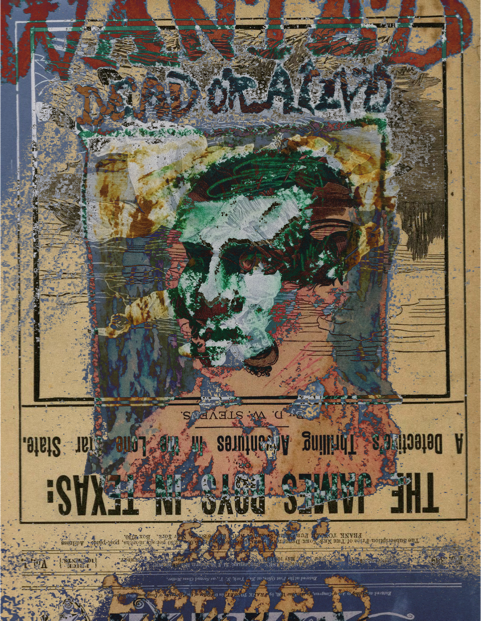Upon his return to western Missouri after the Civil War, Jesse James never looked forward, only back, mythologizing the robberies and murder he’d commit with his brother Frank and the Younger gang till his death, seventeen years later.

In Lawrence, there was a child with a wooden ball, tossing…. The march home, Frank, Cole, Bill, Arch, rinsing creek water over red over pebbles slipping. Squeezing one hand to stop the other trembling. These are facts. These are things. Things not learning resistance to change, knew it before. Never changed his name, always Jesse. Respectable stock, they were from. His father a minister. Prayed in church, family ate respectable food. Lima beans. Brisket. Now I lay me down to… Bushwhackers in the war, militia, nightriders ever after, the trains, banks made of stone, Federales. Inside the outside, cabins, trap doors, tramp camps. Clay County, MO, peering through cloth hood, no claustrophobia, no fear. Knights on horseback bringing order, honor, preserving Clay County. His ire up. Niggers. Nigger-lovers. Yankees. Missouri River coming down from Montana Territory, dividing the country east/west, survey lines, lines imposed by Federal law. He had to explain it, it would sound inexplicable. How you could be so strong. Have to be. Weakness overtakes you. Strength to be. It gathers, his fingers strained with lightning.
On Broadway, readers read their newspapers in the street, street urchins hawking the Tribune, Eagle, men in the bars, odors of cheroot, belching lager, read his name. Jesse James. Jesse James. The name, his name, had church music in it. It floats up in deliverance.
There’s a song upon his death. Sung in theaters. 100 seats. 150. He’d never see a man suffer pain… stopped the Glendale train… Jesse James. He believes sometimes, indulgent faith, kneels on Baptist pew. Wonders at earthly end. At the instant of the hammer click, does he recall a burned-out apple tree, his father’s deacon tenor, arms praising, hands that sluiced the hemp? Scent of hay in his hair. The father set out, 1849, pilgrim like him. Overland through Panama, round Sacramento. World he’d never see. Robert James. Preaching. Cholera. Skin shriveled, eyes, lord, sinking. Shit all over the place. Lord’s servant in California. Buried in Sutter clay region, grave a careless stone. Long past day of Robert Ford, the assassin, Frank kept the uniform of Stone Mountain and Centralia folded up in a press, till more holes than gray cloth. Frank lives, lives to age of the Somme, autos, Nigger trumpet music Jesse’d never hear.
They pass down the trunks. Freightman eyes him from the car. Eyes like a foreigner’s. Takes only an instant. Not a decision—reflex. What’s a life? Always they beg. Begging’s like a piss. The body’s odd old doing. Makes his mouth go dry. Freightman could have had trace of nigger blood in him. Wipes his face, lips. Disdains the blotch on his cuff. Him and Frank. Cole. Jim. Bob. Their voices pestering the realm of Baptist heaven. Remember Black River, 74 maybe, hauling gold, greenbacks on a borrowed mule, mules not used to snow, nostrils spooked. Borrowed mules, eyes going witless. Remember. A stranger’s door answered favorably. Frank’s hat in hand. Shakespeare, Frank could quote around a hearth for entertainment: I am in this earthly world, where to do harm/Is often laudable, to do good sometime/ Accounted dangerous folly. Breakfast grits, fatback, think you’re looking through glass pane, this stranger’s vacant life, kids, poultry yard, wife’s hair a gray streak, mouth kindly. Morning they trade mules, peel off greenbacks. An understanding. Never saw no Jesse James. Maybe he’d of been a banker himself. Jesse. His mind for figures, sizing up value. Horses, real estate. Railroads. Sometimes you go down a road, don’t know you become it. Curiosity to himself sometimes, mirror image as he drags the edge along his neck, like across a moon telling fates and lies. Jesse James. Woodcut in papers of his jawline like a horizon, his slender lips, brows like a slender woman’s. A defect in his mouth his preacher father gave him. Jesse Woodson James. The James-Younger gang has terrified this slumbering Arkansas town with the cold-blooded murder of Townes Leonidas, a 24 year old bank teller, who recently became engaged to Helene Jonson, of Arkansas. The woodcut don’t look like him at all.
Illinois Central, St Louis through Chicago, Cedar Rapids. He reads schedules better than any man, envisions night trains pounding through the mesquite hills and sage, under towering skies. St Paul. Irony, says Frank. Jesse’s smiles flickers, goes out, stealthy. He says, Shut your fliggin’ mouth. Jesse James is a passenger, luggage at his feet. Nods at others, luggage at their feet. He’s Jesse James, he doesn’t say. Jesse James is Jesse James but not Jesse James. Everyone knows he’s two. Multiplying iterations— He becomes Jesse James by necessity. Takes resistance from mud, a stuffed pallet, air stiffens around him. Snap of a twig, horse’s guffaw— Pinkertons. Assassins. Highwaymen. Yankees. Kill him easy as sippin’ coffee. Looking to be famous, big reward. Death crowds him. Takes a seat. A boy, he’d sit in front of the hearth, watching dough rise from the flames, bread brown and warm in his mouth. His mother six feet tall loomed, cattle-voiced. Doesn’t mind lonesomeness, howl of the brush and swamps. Born to lonesomeness and self-conviction, aptitudes forestal oblivion, winter’s load upon your shoulders. On the train, he regards those who are not Jesse James. Stalwart faces. Faces of careless people riding trains. They do not know existence. What is man? Ever after, he’s the one hanging a picture, life a single irreducible moment, ever-after Jesse the man hanging the picture at 10:27 in the morning of a perfect April day. Look ok to you, Bob? he says. Did it ever look ok? He’d want to know.
To become a synonym. Tourists traipsing up to the cabin, talking to Frank and their mother, the picture books, nickelodeons, movies with trumpet and saxophone bands, Robert Ford touring the country, no longer Jesse James, the idea of himself is no longer his, it’s a metaphor that leaves you out of it. Could have heard that song, folksingers like yodelers, their voices keening, rollicking, everyone in the place clapping, and, my god, America’s land of free, and Jesse James going on and on.









